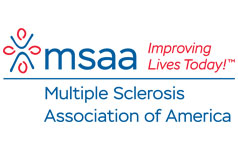 After the symptoms of a relapse have subsided, various types of exercise and/or therapy may be needed to return as much function as possible. Physical, occupational, and speech therapists are trained to help individuals with MS to regain as regain any lost function. These types of services are not only very helpful in terms of mobility, but also in other areas – depending on one’s specific symptoms.
After the symptoms of a relapse have subsided, various types of exercise and/or therapy may be needed to return as much function as possible. Physical, occupational, and speech therapists are trained to help individuals with MS to regain as regain any lost function. These types of services are not only very helpful in terms of mobility, but also in other areas – depending on one’s specific symptoms.
Rehabilitation addresses many of the issues and challenges experienced by individuals with MS. Some of the specific symptoms that may be helped include spasticity, weakness, and resultant movement problems; balance, dizziness, and coordination difficulties; as well as changes in speech, swallowing, cognition, and vision. Treating these specific symptoms, however, is only the beginning. Limitations in movement and other abilities affect other aspects of everyday life, and the different types of therapy offered through rehabilitation work to regain, or find ways to compensate for, lost function. Safety precautions and the prevention of pressure sores are also vital issues that are addressed through rehabilitation.
MS symptoms impact how someone is able to function at work and at home. They affect one’s ability to drive or participate in outside activities. They also play a big role in one’s self image and how an individual interacts with others. As a result, social, psychological, and emotional changes coincide with the onset of physical symptoms.
The unique and wonderful concept behind rehabilitation is that it incorporates an individual’s entire situation, taking into account how physical changes may impact one’s activities, emotions, and wellbeing. With rehabilitation, a team of specialists work together to address all aspects of an individual’s disability. Their overall goal is to improve a person’s quality of life, while helping preserve one’s independence and safety.
To learn more about the different forms of rehabilitation, please refer to MSAA’s article, “The Benefits of Rehabilitation” (An MSAA “evergreen” article published in 2004).













